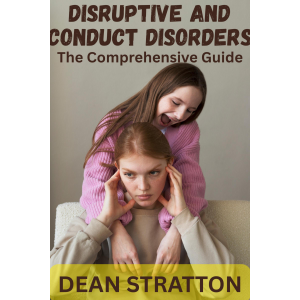

Disruptive and Conduct Disorders - The Comprehensive Guide
DEAN STRATTON
This audiobook is narrated by a digital voice.
Disruptive and Conduct Disorders - The Comprehensive Guide is a thoughtfully crafted resource designed for parents, educators, mental health professionals, and students eager to understand complex childhood and adolescent behavioral conditions. Written with clarity and depth, this guide goes beyond definitions, offering nuanced insights into the causes, symptoms, and evidence-based interventions for disorders such as Oppositional Defiant Disorder (ODD), Conduct Disorder (CD), and Intermittent Explosive Disorder (IED).
This book blends research-backed knowledge with engaging scenarios that bring theory into practice. Each chapter is structured to provide:
Clear explanations of diagnostic criteria and symptom patterns.
Practical strategies for managing challenging behaviors at home, in school, and in clinical settings.
Case-based examples and hypothetical situations that illustrate real-life applications of therapeutic approaches.
Integrated perspectives connecting psychology, neuroscience, and social dynamics.
Whether you are a caregiver seeking understanding, a teacher looking for classroom strategies, or a professional aiming to broaden your expertise, this guide delivers comprehensive knowledge in an accessible, relatable, and highly original format.
Empower yourself with the tools to recognize early signs, respond effectively, and create supportive environments where children and adolescents can thrive despite their challenges.
Duration - 5h 55m.
Author - DEAN STRATTON.
Narrator - Digital Voice Madison G.
Published Date - Tuesday, 21 January 2025.
Copyright - © 2025 VIRUTI SATYAN SHIVAN ©.
Location:
United States
Description:
This audiobook is narrated by a digital voice. Disruptive and Conduct Disorders - The Comprehensive Guide is a thoughtfully crafted resource designed for parents, educators, mental health professionals, and students eager to understand complex childhood and adolescent behavioral conditions. Written with clarity and depth, this guide goes beyond definitions, offering nuanced insights into the causes, symptoms, and evidence-based interventions for disorders such as Oppositional Defiant Disorder (ODD), Conduct Disorder (CD), and Intermittent Explosive Disorder (IED). This book blends research-backed knowledge with engaging scenarios that bring theory into practice. Each chapter is structured to provide: Clear explanations of diagnostic criteria and symptom patterns. Practical strategies for managing challenging behaviors at home, in school, and in clinical settings. Case-based examples and hypothetical situations that illustrate real-life applications of therapeutic approaches. Integrated perspectives connecting psychology, neuroscience, and social dynamics. Whether you are a caregiver seeking understanding, a teacher looking for classroom strategies, or a professional aiming to broaden your expertise, this guide delivers comprehensive knowledge in an accessible, relatable, and highly original format. Empower yourself with the tools to recognize early signs, respond effectively, and create supportive environments where children and adolescents can thrive despite their challenges. Duration - 5h 55m. Author - DEAN STRATTON. Narrator - Digital Voice Madison G. Published Date - Tuesday, 21 January 2025. Copyright - © 2025 VIRUTI SATYAN SHIVAN ©.
Language:
English
Introduction
Duration:00:06:55
Chapter 1: Foundations of Disruptive and Conduct Disorders
Duration:00:00:05
1.1 Historical Perspectives on Childhood Behavior
Duration:00:06:46
1.2 Shifts in Diagnostic Thinking Across Generations
Duration:00:07:00
1.3 Differentiating Disruptive Disorders from “Normal” Misbehavior
Duration:00:06:09
1.4 Exercise: 10 MCQs with Answers at the End
Duration:00:04:22
2.1 Understanding DSM-5 Classifications
Duration:00:06:26
2.2 Cross-Cultural Perspectives on Diagnosis
Duration:00:07:10
2.3 Common Misdiagnoses and Overlaps with Other Conditions
Duration:00:07:51
2.4 Exercise: 10 MCQs with Answers at the End
Duration:00:04:24
3.1 Core Symptoms and Manifestations
Duration:00:05:38
3.2 Risk Factors and Developmental Pathways
Duration:00:07:18
3.3 Daily Life Challenges for Families and Schools
Duration:00:06:21
3.4 Exercise: 10 MCQs with Answers at the End
Duration:00:04:39
4.1 Behavioral Patterns and Severity Levels
Duration:00:06:20
4.2 The Role of Environment in Symptom Expression
Duration:00:06:42
4.3 Long-Term Outcomes and Life Trajectories
Duration:00:06:15
4.4 Exercise: 10 MCQs with Answers at the End
Duration:00:04:17
5.1 Defining Features of Sudden Aggression
Duration:00:04:29
5.2 Neurological and Physiological Underpinnings
Duration:00:05:51
5.3 Family Narratives and Case Examples
Duration:00:05:46
5.4 Exercise: 10 MCQs with Answers at the End
Duration:00:04:27
6.1 Genetic Contributions to Behavioral Disorders
Duration:00:06:55
6.2 Brain Development and Neurochemical Factors
Duration:00:06:47
6.3 Epigenetics: How Environment Shapes Biology
Duration:00:06:08
6.4 Exercise: 10 MCQs with Answers at the End
Duration:00:04:48
7.1 Parenting Styles and Household Dynamics
Duration:00:06:44
7.2 Peer Influence and Social Learning
Duration:00:06:05
7.3 The Impact of Media and Technology
Duration:00:05:58
7.4 Exercise: 10 MCQs with Answers at the End
Duration:00:04:30
8.1 Emotional Regulation and Impulse Control
Duration:00:06:18
8.2 Cognitive Distortions and Thought Patterns
Duration:00:05:36
8.3 Academic Challenges and Learning Differences
Duration:00:06:40
8.4 Exercise: 10 MCQs with Answers at the End
Duration:00:05:01
9.1 Tools and Structured Interviews
Duration:00:05:54
9.2 Observational Methods in Schools and Homes
Duration:00:06:41
9.3 Ethical Considerations in Labeling Children
Duration:00:05:33
9.4 Exercise: 10 MCQs with Answers at the End
Duration:00:04:18
10.1 Cognitive Behavioral Therapy (CBT) Applications
Duration:00:05:36
10.2 Parent Management Training (PMT)
Duration:00:06:02
10.3 Family Therapy and Systemic Models
Duration:00:06:01
10.4 Exercise: 10 MCQs with Answers at the End
Duration:00:04:44
11.1 Medication Options and Their Uses
Duration:00:06:36
11.2 Managing Side Effects and Risks
Duration:00:06:21
11.3 Integrating Medication with Psychotherapy
Duration:00:05:13
11.4 Exercise: 10 MCQs with Answers at the End
Duration:00:04:33
12.1 Creating Inclusive Classroom Environments
Duration:00:06:24
12.2 Behavior Management Plans and Reinforcement Systems
Duration:00:06:06
12.3 Teacher–Parent Collaboration Models
Duration:00:05:51
12.4 Exercise: 10 MCQs with Answers at the End
Duration:00:04:44
13.1 Public Health Approaches to Prevention
Duration:00:05:38
13.2 Legal Systems and Juvenile Justice Interventions
Duration:00:06:24
13.3 Advocacy and Support Networks
Duration:00:06:23
13.4 Exercise: 10 MCQs with Answers at the End
Duration:00:04:28
14.1 Early Childhood Interventions: A Success Story
Duration:00:04:52
14.2 Adolescence and Peer Pressure: A Turning Point
Duration:00:05:11
14.3 Transitioning into Adulthood: Lessons Learned
Duration:00:04:52
14.4 Exercise: 10 MCQs with Answers at the End
Duration:00:04:54
15.1 Emerging Therapies and Innovations
Duration:00:05:56
15.2 Integrating Technology into Treatment
Duration:00:05:48
15.3 Building Resilient Families and Communities
Duration:00:05:09
15.4 Exercise: 10 MCQs with Answers at the End
Duration:00:04:55
Conclusion
Duration:00:03:58